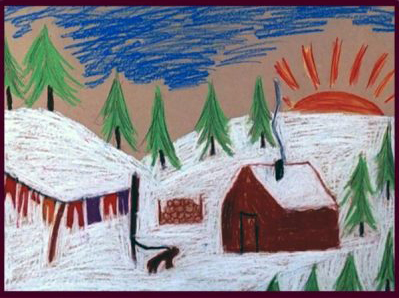Christmas at Moose Factory
by Alanis Obomsawin

About the Film:
Released in 1971, this lyrical short documentary marked the directorial debut of legendary Abenaki director Alanis Obomsawin. Filmed at a residential school in northern Ontario, it is composed entirely of drawings by young Cree children and stories told by the children themselves. Listening has been at the core of Obomsawin’s practice since the very beginning. “Documentary film,” she said in a 2017 interview, “is the one place that our people can speak for themselves. I feel that the documentaries that I’ve been working on have been very valuable for the people, for our people to look at ourselves… and through that be able to make changes that really count for the future of our children to come.”
Christmas at Moose Factory
1971 | 13 min
BIG IDEAS with Film Unit: Narrative Drawing
Time required: 8-10 lessons
Grade(s): 4-12
Unit Overview:
This unit has been created to help teachers and students to learn with Alanis Obomsawin’s documentary film Christmas at Moose Factory in the classroom. Students will learn about Alanis Obomsawin’s mission to tell stories through her documentary and learn about Moose Cree First Nation. Using the stills in the documentary that were created from drawings of students attending a residential school, this film offers opportunities to open the discussion and reflection on Indigenous peoples’ lives and experiences and connect with units relating to residential school history and impact in Canada.
This guide suggests a set of activities for grades 4-8 and adapted ideas for grades 9-12.
BIG IDEAS with Film Inquiry Questions
These questions can be adapted into a worksheet to fill in during or after film screenings:
- Who is the filmmaker, what are they known for?
- What is this film about? What are the main messages the filmmaker wanted us to understand?
- If you could ask the filmmaker a question, what would you ask?
- What were you thinking as you finished watching the film?
- What part of the story told by the film was the most powerful or memorable? Why?
- Sometimes fiction and documentary films explore important social or political issues. Describe any specific social or political issues that affect the story. How do these issues impact the people we saw in the film?
- Documentaries can show us new ways of understanding an issue or topic in our world. Describe an aspect of the film that showed you something you hadn’t seen before, caused you to think in a new way, or helped you understand something more thoroughly than before.
- What particularly appealed to you in the cinematic presentation of the film, such as how particular scenes, images, or sounds were presented?
- For documentary films: what conventions does the filmmaker incorporate in this film? Do they use voiceover, re-enactments, archival footage, interviews?
- Are there multiple viewpoints? Do they agree or contradict each other?
- Who are the dominant voices in the documentary? Are they official sources such as government representatives, or are they experts of another kind? Or are they everyday people from the street? What is their connection to the documentary’s subject?
Questions and Connections
Key questions can be used before film screening or after, to help students see connections between their own lives and the ideas and perspectives they see in Obomsawin’s films. Select from questions and tailor them to your grade level.
- How much do you know about First Nations’ history? Do you know anything already about the Truth and Reconciliation Commission of Canada?
- Were you born in Canada? If not, where were you born? How important to you is that country’s culture, heritage, and language to you and your family?
- Do you speak more than one language? If so, do you feel more connected to another nation’s culture (and history) when you speak in that language? Do you speak that language with senior family members, such as aunts and uncles, grandparents, and great-grandparents?
- Do your friends have cultural traditions and customs that are visibly and audibly different from those of your family? If so, can you elaborate? Do you participate with your friends and their families during special cultural events? If so, would you like to share some of your thoughts and experiences?
- Have you personally ever felt or experienced a loss of human rights? If so, what happened, and how did you deal with the situation?
- Imagine if somebody took you away from your family/community and you had to live and attend school in a community far away from all your family and friends. How might you feel? What would you do?
- What if you were forbidden from speaking the language you have been speaking since you were a baby? What if you were forced/ordered to learn and speak a new language?
- What types of music do you and your family listen to together? Do you make music together? Have your grandparents shared any music with you? Has your family taught you any particular songs and/or dances? Does having a musical heritage make you feel more connected to the past?